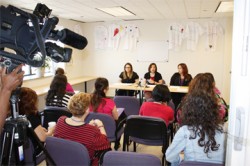 Mujeres Latinas en Acción held a press conference for the release of Latina Portrait: Latinas and Sexual Assault, the latest in a series of reports tying pressing issues to Latinas’ experiences. Latina Portrait, written by Neusa Gaytan and Maralá Goode, focused specifically on Latina sexual assault survivors, the barriers they face, and the culturally appropriate services necessary for the recovery process. “It is important that we release this Latina Portrait during Sexual Assault Awareness Month to bring attention to the needs of Latina survivors during the recovery process,” said Maria Socorro Pesqueira, the president and ceo of Mujeres Latinas en Acción. “We must ensure that these women receive services that embrace their values and culture to provide the most complete care possible.”
Mujeres Latinas en Acción held a press conference for the release of Latina Portrait: Latinas and Sexual Assault, the latest in a series of reports tying pressing issues to Latinas’ experiences. Latina Portrait, written by Neusa Gaytan and Maralá Goode, focused specifically on Latina sexual assault survivors, the barriers they face, and the culturally appropriate services necessary for the recovery process. “It is important that we release this Latina Portrait during Sexual Assault Awareness Month to bring attention to the needs of Latina survivors during the recovery process,” said Maria Socorro Pesqueira, the president and ceo of Mujeres Latinas en Acción. “We must ensure that these women receive services that embrace their values and culture to provide the most complete care possible.”
Maritza Reyes, the director of the Sexual Assault Program at Mujeres Latinas en Acción, delved into the details of the report, speaking about child sexual abuse, human trafficking, and sexual assault. Between 2008 and 2012, the number of Latinos receiving services at ICASA affiliated centers rose from 28 percent to 35 percent in Cook County, mirroring the growth of the Latino population. “Many Latinas face additional barriers to reporting sexual assault and seeking support, including discriminatory treatment from institutions, lack of staff that both speak Spanish and are trained in the area of sexual violence, and a lengthy legal process leading to low prosecution of perpetrators,” said Maritza. Culturally sensitive practices must increase to better serve the needs of immigrant Latina survivors of sexual assault.
The conference ended with Itzel Camacho, a Mujeres client and sexual assault survivor, sharing her empowering story about coming to Mujeres: “One day, I decided to just walk into Mujeres and speak with someone to help me deal with my nightmares, my worries, and my wounds that felt like they would never heal. I began to meet with a counselor… Weeks and weeks passed by and I wasn’t the angry, sad, disgusted, and scared anymore.” Itzel spoke about her future and her application for the U-visa, a visa that gives victims of certain crimes temporary legal status and work eligibility. Itzel’s story exemplified the bravery of survivors and need for services that are educated about the specific needs of Latinas.








